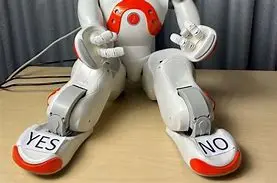According to a recent study, robots may be more effective than parental or kid self-report assessment at identifying problems with children’s mental health.
A team of roboticists, computer scientists and psychiatrists from the University of Cambridge carried out a study with 28 children between the ages of 8 and 13, and had a child-sized humanoid robot administer a series of standard psychological questionnaires to assess the mental well-being of each participant.
The children were willing to confide in the robot, in some cases sharing information with the robot that they had not yet shared via the standard assessment method of online or in-person questionnaires. This is the first time that robots have been used to assess mental well-being in children.
The children were willing to confide in the robot, in some cases sharing information with the robot that they had not yet shared via the standard assessment method of online or in-person questionnaires. This is the first time that robots have been used to assess mental well-being in children.
Robots may complement conventional methods of mental health assessment, according to the researchers, but they are not meant to take the place of expert mental health support. At the 31st IEEE International Conference on Robot & Human Interactive Communication (RO-MAN) in Naples, Italy, the findings will be presented today, September 1.

The mental health of many children was harmed by homeschooling, financial strains, and isolation from peers and friends during the COVID-19 pandemic. However, anxiety and despair among youngsters in the UK have been on the rise even before the pandemic, but there are very little tools and supports available to treat mental health issues.
Professor Hatice Gunes, who oversees the Affective Intelligence and Robotics Laboratory at the Department of Computer Science and Technology in Cambridge, has been researching the potential benefits of socially-assistive robots (SARS) for children in addition to how they can be used as mental health “coaches” for adults.
After having children, Gunes became considerably more interested in how children express themselves as they mature and how that can relate to her work in robotics. Children are very tactile, and they enjoy using technology. When someone is utilizing a screen-based technology, they are cut off from their surroundings. However, since they exist in the real world and are more interactive, robots are ideal because they keep kids’ attention.
With colleagues in Cambridge’s Department of Psychiatry, Gunes and her team designed an experiment to see if robots could be a useful tool to assess mental well-being in children.
“There are times when traditional methods aren’t able to catch mental well-being lapses in children, as sometimes the changes are incredibly subtle,” said Nida Itrat Abbasi, the study’s first author. “We wanted to see whether robots might be able to help with this process.”
For the study, an Nao robot—a humanoid robot that stands about 60 cm tall—met with 28 participants between the ages of 8 and 13 one-on-one for 45 minutes. Members of the research team and a parent or guardian watched from a nearby room. Children and their parent or guardian completed a common online questionnaire before to each session to gauge each child’s mental health.
Read More
- The first radiation belt spotted outside of our solar system is being seen by astronomers
- Networks of nanowires Learn and retain information like a human brain
- Data on populations will be strengthened by new technology and increased processing capacity.
- The development of high-efficiency sustainable solar cells by scientists



